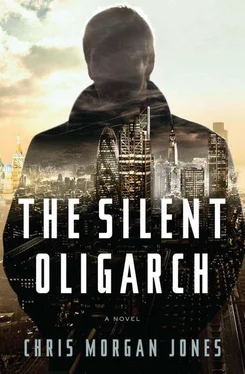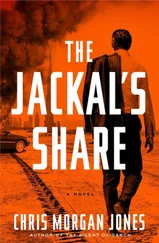“Which means?”
“Someone thinks she knows something. It sounds as if her flat was broken into and they think it was Russians. Or perhaps Gerstman’s office. Then as he was ordering me out he said something about calls she’d had in the last ten days. I didn’t get a chance to ask her. I was more or less marched off the premises.”
“Could you call her?”
“Perhaps. I’ve promised her news from Hungary, if I get any. I don’t think she likes me either, but she doesn’t seem to hate me.”
The phone on the boardroom table rang. Mr. Tourna was in reception. Webster collected him and introduced him to Hammer, who looked skinny and pale beside him. Tourna, pristine in a light tweed jacket, baby-blue cashmere sweater and white shirt, looked as ostentatiously healthy as he had on his yacht.
Hammer was always delighted to meet a rogue and took on most of the small talk; Tourna, like most clients, was charmed. Hammer had a conman’s talent for finding a person’s passion and appearing to know all about it, and for five minutes he quizzed Tourna about boats, and sailing, and the relative merits of marinas throughout the Mediterranean and beyond.
“No, only sail, Mr. Hammer, only sail. I may look vulgar but I despise those floating brothels with their helicopter pads and their swimming pools. You can swim in the sea, no, if you want to swim? Ridiculous. Let me tell you, Mr. Hammer, I met a man once in Shanghai. We had been discussing some business. He asked me to come aboard his yacht. You have a yacht in Shanghai I ask, and yes, he says, in the harbor. The most beautiful yacht you will see. Well, there are many ships in Shanghai harbor but not so many yachts, I think. So I go. And there in the harbor is this monstrous big shining cream office block—with a helicopter on it, naturally. And we go on board and there are gold taps and beds in the shape of seashells. All very tasteful. And I ask my friend, where do you go? And he doesn’t understand. I say, where do you take her—because, for the life of me, I cannot think where I would want to sail near Shanghai. And he looks at me for a moment, still not understanding, and then he laughs, and he says, oh no, there’s no engine. You can’t go anywhere in it. The engine room is empty.” Tourna bellowed out a laugh. “It’s probably still there now!” Hammer laughed too, and Webster gave what he hoped was an enthusiastic smile. “So, gentlemen,” said Tourna, his face taking on the look of urgency that Webster had seen in Datça, “how are you getting on?”
They sat at the table. Webster handed out copies of the agenda and his report. Tourna took a minute to scan each document, then set them carefully to one side and looked Webster square in the eye.
“OK. This is interesting. This is nice. But this is not progress. Your fees are killing me. There is more in your invoices than in these reports, that’s for sure. You seem to have forgotten what I want.”
“I understand. There have been times in the last few weeks when I’ve thought we simply couldn’t do it.”
“If you can’t do it then we stop today. This is not a fishing expedition.”
“I think we can. Let me tell you what I think we’ve learned. You’re right about Malin. He’s creaming off more from the Russian state than all his peers. But that’s not enough. To prove that you’d need to go deep into Russia, so deep you’d probably never come back. And there’s nothing in his past to convict him. No one talks. He owns everyone who might know something.”
“So,” said Tourna, with a glance at Hammer, “how is that not hopeless?”
“You stop looking at him and look at his organization.” Webster was animated now, leaning forward and tapping his points home on the table. He took a copy of the report, turned it over and with a pencil drew on it a figure eight on its side—an infinity sign. “In Russia, he has this big operation, beautifully organized and black as pitch.” He started shading in the right-hand side of the eight. “You can’t see in. It’s in there that he steals the money, and it’s in there that he runs his investments. But the money has to come out before it can go back in. So in the West, in a hundred offshore companies, is the other big operation.” With his pencil he pointed to the other side. “More beautiful still, if anything. Layer upon layer. You can get a glimpse of it but you can’t get past the front door. And here, where the two sides meet, here sits Richard Lock, looking both ways.”
“So he knows everything?” said Tourna.
“So he knows everything. But better, if anything, without him none of this works. Everything has to go through him.” Webster paused for a second. “Have you read the updates I’ve been sending you?”
“I have.”
“Then you know about Dmitry Gerstman?”
“Yes, I do. Nasty business. Around Malin it does not surprise me.”
“It surprised me.” Webster and Tourna shared a look. “We don’t know who killed Gerstman, or if anyone did. But one thing I do know is that Lock is very scared.”
“This is a hypothesis?”
“No, this is fact. We had someone talk to him after he had given evidence in Paris.”
“My God, he was horrible in Paris.” Tourna gave a short bark of a laugh. “I’ve never seen anything like it. He started OK, he’d been prepared, but Christ, when our QC got his claws out? It was bloody. Bloody. If I were Malin I’d have called me after an hour and begged to settle. Who spoke to Lock?”
“I can’t tell you that.”
“OK. What did he say?”
“He’s scared. He knows he did badly this week and he’s scared to go back to Moscow. At least he was; he might be back there by now. I should imagine he’s terrified that he’s going to be next.”
“He’s scared. Good. He should be. So what?”
Webster hesitated for a moment. It crossed his mind that this was an ugly business, trading in a scared man’s fear. He went on. “Malin can’t live without Lock. Without Lock the fiction collapses. It’s a big lie, and he’s the man paid to do the lying. If we persuade him to tell the truth, then it will almost certainly win your lawsuits. Malin has to explain himself to everyone, and his business will be crippled at the same time. All his financing will dry up. Bryson Joyce may have to resign.”
“I don’t get it. If Lock gives evidence for us, he’s out of a job and he’s just made a big fucking enemy. Why would he do it?”
“Because,” Hammer said, “we’re at the stage now where the FBI and a number of others are taking an active interest in Mr. Lock’s case. I had a conversation with a friend of mine at the Bureau this week and they see great potential in him. In pure dollar terms, he’s one of the biggest money-launderers they’ve ever seen. And I hear from them that the Swiss are having a good look too.”
Tourna sat back, pushed his chair a foot or two away from the table, and pulled at his bottom lip while he thought. Like Hammer, he was a fidget, but where Hammer tapped and chewed he used his whole body. His leg jigged, he sat forward. As he watched him, Webster wondered whether Hammer had indeed made that call, and if so what had been said. He thought they were holding off until after this meeting.
“Mr. Hammer,” Tourna said at last. “What do you think?”
Hammer put down his pen. “It’s a big opportunity. Like all big opportunities, it comes with risks. The risks here are not really to us. They’re to Mr. Lock. You risk some fees, we risk reputation, but Lock could be in real trouble. Ben has had a difficult couple of weeks. It’s not usual for the people we interview to wind up dead. It’s not usual for us to be accused of causing it, either. But I think I’ve persuaded him that the best way to protect Lock, long term, is to help him out of this mess. He’s in way over his head. I can tell. I’ve seen so many of these guys. Some are tough enough, but he isn’t. So one day, something’s going to happen to bring Malin’s castle tumbling down, and Lock? He’s going to wind up dead or in jail. If he’s lucky, under house arrest in Moscow. The one way he can avoid that is by seeing the light. I suggest we show it to him.”
Читать дальше












